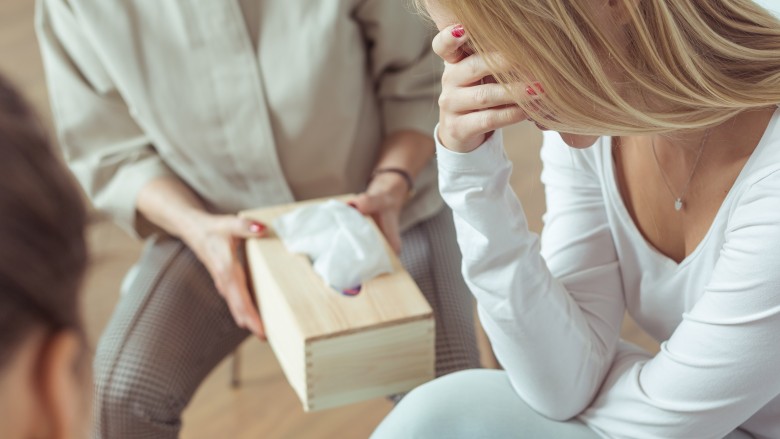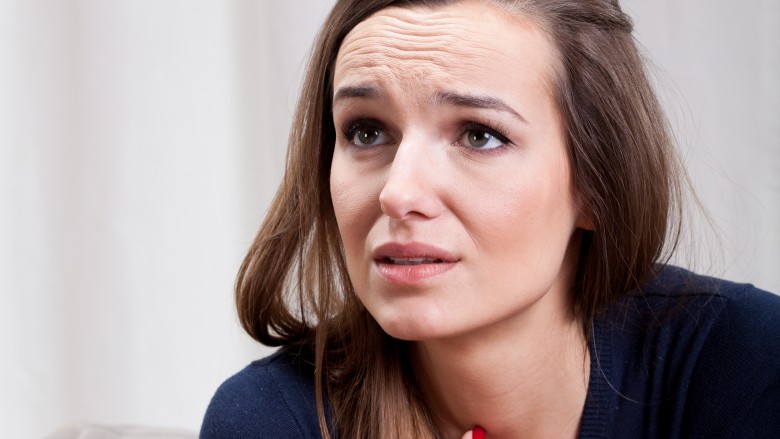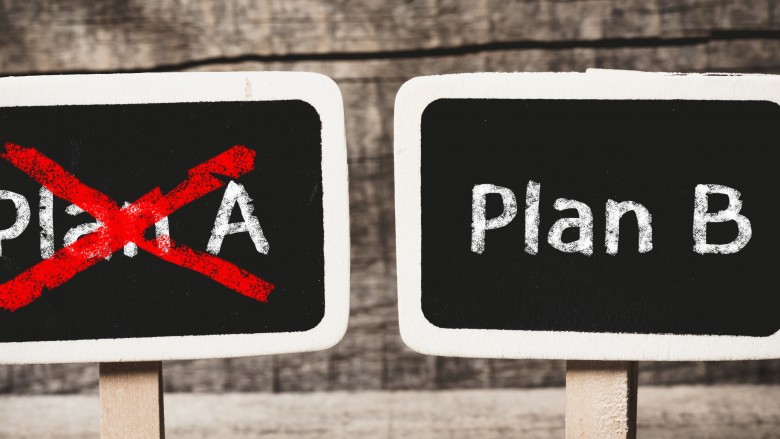What I Learned From Having Cancer And Infertility
When I think about the last four years of my life, the first thing that comes to mind is the beginning of the Fresh Prince of Bel Air theme song:
This is a story all about how
My life got flip-turned upside down
And I'd like to take a minute and sit right there
And tell you how I became the prince of a town called Bel Air
Granted: I am, alas, neither royalty nor living in Bel Air (sigh) — but I have learned quite a few things since my life first got flip-turned upside down.
It all began in spring 2013, when I suddenly gained about 30 pounds in the span of six weeks, and then began having major gynecological problems. I was, to everyone's total shock, subsequently diagnosed with endometrial cancer. Because it was caught early and because my doctors knew I desperately wanted to have kids, we decided to treat the cancer with medication instead of opting for a hysterectomy. I was on medication for a little over a year, after which I happily got a clean bill of health and the green light from my medical team to start trying for a pregnancy.
Despite multiple rounds of medication, enough fertility-enhancing supplements to fill a Winnebago, religious adherence to my Yoga for Fertility DVD, and a willingness to make sacrifices at the altar of every fertility-related deity in the history of human civilization, I was never able to get pregnant. And then, the other shoe dropped: the cancer came back. That's when we all knew I had to get a hysterectomy. Parting with my entire reproductive system, especially without ever having used it for its intended purpose, was brutally hard. I've struggled with the fallout of the whole experience, which has included fun things like menopause, fibromyalgia, and intense depression over the loss of my fertility.
Now that the fog is lifting and I'm starting to both rebuild my life and feel better, things are definitely looking up — and I'm able to look back and think about what I've learned, both about myself and about how to respond to adversity.
It's okay to be not-at-all-okay
One of the first things I learned was that putting on my brave face, let alone my "no, really, I'm fine" face was often totally impossible. I wanted to, but I simply couldn't — and when friends and coworkers would ask me how I was doing, I'd often have to accept the fact that my eyes were going to well up (no matter how hard I tried not to cry). I wanted to be all warrior about this. I wanted to be all matter-of-fact and unflappable, like Michonne crossed with Buffy the Vampire Slayer and a dash of Jessica Jones. But I wasn't, and there was no hiding it. So, instead, I decided to roll with it and accept that being not-even-remotely-okay was, in fact, totally okay.
I feel like modern society often tells us that we need to be unyielding in the face of adversity, or to always smile and stay positive. But, as it turns out, "smile, though your heart is breaking" can be pretty lousy advice. I simply couldn't be a stoic warrior queen, so I decided to just accept that I was not okay, and that I probably wasn't going to feel normal again for quite some time.
Accepting this did two important things: first, it enabled me to figure out who I can be truly vulnerable with. While, yes, there are people who freak out and run away or, alternatively, get judgmental when dealing with a person's pain or struggling, there are plenty of others who step up and make it clear that they'll catch you whenever you fall. Those friends are true gems, and when things really hit the fan, knowing who will be there to support you is invaluable. Secondly, and perhaps most importantly, it freed up a lot of my energy and emotional resources that would've been otherwise diverted. As a result, instead of trying soooooo very hard to pretend to be brave, unflappable, and strong, I could focus on getting through the pain and, eventually, coming out the other side.
It's also okay to ask for help
The other good thing that came from putting my brave face in storage was that it allowed me to admit that I needed help — and a lot of it. As it turns out, despite the cultural norm that we should all pull ourselves up by our bootstraps with no help from from anyone, there's actually no shame in admitting that you could use a helping hand. Or twenty.
For me, that help has come in many forms: telling my friends that I needed meals and people to keep me company when I was recovering from my surgery, admitting that I was seriously depressed and enlisting my husband to help me find a therapist who specializes in infertility issues, getting on antidepressants, and talking with my friends about coming to grips with the fact that my reproductive window has slammed shut and is now sealed behind a steel-reinforced brick wall.
Jealousy and sadness are normal
Yet another cultural norm that we're often taught is that jealousy is an ugly emotion — one that you shouldn't feel, and if you feel it, you sure shouldn't express it.
Well, I say eff that.
If there's one thing that all of this has taught me, it's that jealousy is normal. It's totally normal to look at someone else's life — in my case, to look around and see so many women who are healthy and fertile — and wish that you could have it too. That's not ugly or inappropriate.
In my mind, there are two things that separate normal jealousy from toxic jealousy: the first is resentment, and the second is what you do with it. It's one thing to be jealous — to wish that you could also have the thing/circumstance you yearn for — but it's a totally different animal to wish that other people couldn't have it just because you can't. I'd be lying if I said that friends' pregnancy announcements don't make my heart ache, but I'd never, ever want them to go through what I've experienced. I don't resent them for their fertility or health, I just wish I could have those things too. I'm happy for them, but sad for me.
It's what you do with the jealousy and sadness that really counts
What you do with jealousy and sadness is, in my opinion, a huge piece of the puzzle. I'm learning that it's important to let myself feel — deeply and, let's be honest, miserably — those emotions, but it's also important not to wallow. If I stay mired in my sadness for too long, I start getting depressed. If I simmer in jealousy for too long, it turns into resentment. For me, there's a moment where feeling the feels reaches a point of diminishing returns, and I have to get my bum up off the couch and figure out a way to manage it.
The other thing I've learned that I can't do is let my jealousy and sadness affect my behavior towards other people. I can't let it lead me down the path of being rude or snarky towards the people I'm jealous of, and I definitely can't let it fester and turn into resentment. Instead, what I must do is be honest when that jealousy and sadness rear up (and believe me y'all, they definitely do). If I'm feeling awful, I need to talk about it with people I trust, whether it's my husband, my mom, or my therapist, and find ways to work through it.
There was an instance where, just before my surgery, I was standing at a street corner with a crowd of people as we all waited to cross the street. I looked around only to realize that I was the only woman in that entire crowd who wasn't pregnant. The despair and envy I felt as I realized this were overwhelming. I mean, seriously? Was this a joke? (Ok, so my inner monologue was actually a lot more expletive-ridden than that, but you get the idea). I was thankfully close enough to my apartment that I was able to suppress the tears until I was inside, but then I lost it. I had to let the jealousy and sadness crash over me like a giant wave, and then, as I talked through it with my husband and my mom, I had to let it recede.
It helps to control what you can
One of the most miserable aspects of my experience was the feeling that I had almost no control over what was happening to me. At first, the lack of control was maddening: what was the point of doing anything if I had no way of controlling the outcome? After all, I'd done everything right, both in terms of trying to get pregnant and preventing a recurrence, and yet, there I was.
Gradually, though — and with the help of my therapists, husband, family, and friends — I started to change my perspective. I realized that, although I couldn't control many of the things that were happening, it was within my power to focus on the things I could control.
For example, while I didn't have control over the outcome of my situation, I could do things to help my body heal from surgery: things like getting lots of rest (and, contrary to my usual nature, never fighting against the urge to take a nap), drinking lots of kale smoothies, eating lots of protein, and listening to guided meditations that helped me envision my body healing itself and eventually being healthy, strong, and whole.
This mindset shift also helped me realize that, although I couldn't control the outcome itself — the consensus from every doctor we consulted was that I definitely had to get the hysterectomy — I could control my response to it. I could admit that I wasn't ok, rally love and help from my support network, and figure out how I was going to move forward with my life, even though I didn't get the outcome that I'd hoped for. I could choose to work towards someday being okay and feeling like myself again.
When option A isn't available anymore, that's when it's time to focus on kicking the s**t out of option B.
This has been my mantra since my surgery, and it's an idea that came from an incredibly poignant Facebook post that Sheryl Sandberg wrote after the tragic death of her husband, Dave. When a friend agreed to stand in for her late husband at one of her kids' father-child school events, she'd cried "'But I want Dave. I want option A.'" As she writes, her friend "put his arm around me and said, "Option A is not available. So let's just kick the s**t out of option B."
I'd read the post about a week before I started having symptoms of recurrence, and as I sat with one of my friends, weeping into the frozen yogurt she'd so kindly bought me, she reminded me of its relevance. The fact is, I'm not able to be a mom in the way I'd always dreamed of being. I desperately wanted things to turn out differently, but this is my reality.
But, when I started thinking in terms of kicking the sh*t out of option B, I started to consider all the ways that things could work out, just in ways that I hadn't considered before. And the more I thought about it, the more I realized that option B might be just as great as, if not better than, option A. After all, I've heard all sorts of stories about that: people's plans get upended or totally destroyed, but something even more beautiful, wonderful, or gratifying emerges instead.
Grief, sadness, and anger are inevitable, but bitterness is a choice
Facebook, for all its flaws, managed to bring me some immensely helpful quotes and posts when I needed them the most. One day when I was feeling particularly sour about the hand I'd been dealt, I stumbled upon a post by Elizabeth Gilbert (author of Eat, Pray, Love) that struck such a deep resonance with me that I bookmarked it and return to it often. In it, she writes:
I don't care who you are, or how pretty your life may look from the outside — after a certain number of years, it's just a fact: some sh*t has gone seriously wrong for you.
But this is where the interesting part begins.
Because now you have choice.
What kind of a person are you going to be, from here on out?
What's the rest of your life going to look like?
If you decide to become a bitter person, who could blame you? Chances are, you have a list of offenses as long as your arm to justify that choice. The world is a hellhole full of liars and scumbags, and you are its victim, and you can produce 87 reasons to prove it — and nobody can dispute your claims, because it's all TRUE.
Or, you can become something else.
You have a choice.
It was like the universe had smacked me between the eyes with an important message: you can be sad, angry, and disappointed. You can grieve your loss. All of those are normal, and if managed appropriately, they are healthy. But bitterness? That is a choice.
And so, I've made it my mission not to be bitter. I'm at a point now where, probably 75% of the time, I'm in a pretty good place when it comes to accepting what happened and moving on with my life — but when that other 25% rises up (and it does), I remind myself that I have chosen, and will continue to choose, not to be bitter.
Similarly: loss is inevitable, but waste is a choice
Similar to the realization above about bitterness, I had an epiphany while watching the pilot for Nurse Jackie (I don't know why I get so many of my a-ha moments from random bits of pop culture — it's weird, I know): while I can't control what happened, and I may never know why it happened, I can make sure that my loss and my own personal tragedy is not a waste.
For a while after I first got sick, I spent untold hours raging against what felt like an unprovoked hostile attack on my body and the life I was building. I wanted, desperately, to understand why this was happening.
But the fact is, I have no idea. Heck, there might not even be a reason. It could all just be arbitrary crappiness that I just happened to have land in my lap — there's no way to know. I spent heaps of time and energy trying to come up with an explanation for why all this was happening to me, but then I realized that it was making me feel worse, not better.
I had just decided that I wanted to focus on making something meaningful or something good come out of a horrible experience when I saw the Nurse Jackie pilot. In it (spoilers ahead, in case you haven't seen it), she forges the organ donation signature of a young patient who'd tragically died in a car accident. As she's writing the patient's name on his ID, she explains to the audience that she's doing this so that the young man's death, while a horrific loss, won't also be a waste.
That's when a lightbulb went on for me, and since then, I've started to write publicly about my experience. While I'd never choose to have this happen (and I will on a one-way mission to Mars, replete with a live velociraptor as my co-pilot, before I start calling this whole thing a "journey"), I hope to at least bring some redemption into the picture by writing about infertility and, hopefully, both breaking some of the taboos and complex emotions surrounding it. My experience was awful, and it involved the irretrievable loss of something I'd desperately wanted my whole life. It would always be a loss, and it would always be horrible — but I want to ensure that it's not a waste.








